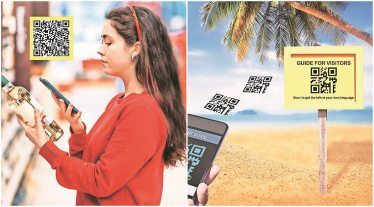Kerala launched a QR code-aided e-guide to boost tourism at its iconic destination, Fort Kochi, last month. The aim is to give access to visitors relevant information such as distance to the nearest bus-stand, railway station and airport, working hours of a tourist destination and its contact numbers.
Besides Kerala, the Dakshina Kannada district tourism department also plans to launch QR code technology to provide details of all tourist places in the district, while Mahabaleshwar in Maharashtra has already launched the Go-Mahabaleshwar microsite this year to bring local service providers to operate businesses without the involvement of aggregators. It will enable the town’s travel-tourism ecosystem to be on one single QR code.
“For consumers and travellers, the microsite will be a one-stop destination to book all their travel requirements and allied services in the town. Such collaborations will ensure growth of the local travel-tourism ecosystem is promoted via digitisation and there is an ease of consumption of services,” said Vineet Toshniwal, founder and CEO of BizzO, the mobile app service that created the QR code services in Mahabaleshwar. However, such initiatives are still in nascent stages as foreign tourist arrival is still very low, one-tenth of what it used to be, said Rajiv Mehra, president of The Indian Association of Tour Operators (IATO), Delhi-based apex body representing more than 1,600 inbound tour operators.
QR codes come in handy in several other ways as well. For instance, mobile check-in counters that use QR codes can streamline the check-in procedure at airports, hotels, hospitals, while one can access travel-related information on smartphones. Recently, Delhi Airport’s arriving terminals have BAGG TRAX, an RFID-enabled baggage tag by scanning the QR code given on the box or visiting “Bag.Hoi.in” passengers can tag their check-in luggage.
Not just travel, QR codes are being used innovatively in other industries too. The beverage industry too has found a way to detect fake whiskey. A team of biomedical engineers from Purdue University in Indiana and the National Institute of Agricultural Sciences in South Korea have developed a QR code on an edible silk tag that manufacturers can place in bottles of whiskey to confirm its authenticity by simply scanning the tag on a smartphone. The new anti-counterfeiting technology will find a solution for the alcohol industry and address fake medications. The developers, Jungwoo Leem, a postdoctoral research associate, and Young Kim, both are part of Purdue’s Weldon School of Biomedical Engineering, and have developed this edible QR code. “Some liquid medicines contain alcohol. We wanted to test this first in whiskey as whiskey has higher alcohol content,” said Young Kim, associate head for research and an associate professor in Purdue’s Weldon School of Biomedical Engineering in the research report published on Purdue University website. Thus, making the tags involves processing fluorescent silk cocoons from specialised silkworms to create a biopolymer, which can be formed into a variety of patterns to encode the information.
QR code now is also important in medicines as the Union government has introduced QR codes to ensure authenticity and traceability of 300 common drug brands, including 300 lifesaving drugs. Fake drugs are a global threat. QR codes for drug safety can go a very long way in managing drug counterfeits and proper administration of medicines to patients. Medicine packages that now come with QR codes offer transparency about the manufacturing process, contents of the drugs and expiry date. “The medicine packs with a unique QR code will help trace the source and affirm the authenticity of products. We may see all the information stored on a QR code and minimal information on the actual packaging of pharmaceutical medicines, drugs and other products,” says Nikkhil K Masurkar, executive director, Entod Pharmaceuticals, Mumbai-based pharmaceutical company.
The health ministry-issued rule notification will be applicable from January 1, 2023. It mandates companies to put QR codes on active pharmaceutical ingredients manufactured or imported in India.
